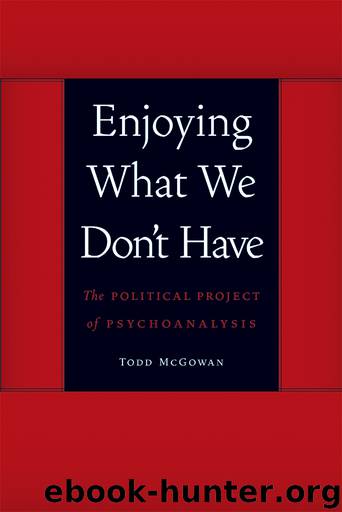Enjoying What We Don't Have by Todd McGowan

Author:Todd McGowan [Hawthorne, Melanie C.]
Language: eng
Format: epub
ISBN: 978-1-4962-1052-4
Publisher: University of Nebraska Press
Published: 2018-03-10T16:00:00+00:00
8
The Politics of Fantasy
Philosophy versus Fantasy
Shifting the emphasis of politics from the question of knowledge to the question of enjoyment requires a rethinking of the role that fantasy plays in political struggle. Fantasy is how subjects and societies organize their enjoyment. Even if fantasy tends to promise more enjoyment than it ultimately delivers, it provides the frame through which subjects locate the experiences that bring them enjoyment. But the political verdict on fantasy has been almost universally negative. Though utopian socialists use fantasies of a nonantagonistic tomorrow to motivate adherents, serious political thinkers, especially in the tradition of Marx, tend to emphasize the deleterious effects of fantasy on political awareness. Political thinkers have inherited this indictment of fantasy from Western philosophy itself, which has made the critique of fantasy in some form or other one of its central projects since Plato wrote The Republic. But psychoanalytic thought offers a way of redeeming fantasy while avoiding the progressivism that seems to inhere in the very structure of fantasy. This places it at odds with the political vision articulated throughout the history of Western philosophy and offers a new way of conceiving politics.
The great figures of Western philosophy, at least prior to Marx, are not known for their political radicality. If there is a politics of philosophy as such, it would seem to be some version of conservatism. From Plato onward, the history of philosophy is a history of justification for inequality in social relations. Plato begins this tradition by showing, according to Jacques Rancière, that “democratic equality is just the inequality of tyranny.”1 Near the other end of the tradition, Hegel insists on the philosophical necessity of the monarch — the pinnacle of inequality — in order for the people to constitute themselves as a people. The monarch acts as a form of punctuation mark, in Hegel’s political philosophy, that provides a limit through which the state gains a definitive essence.2 Like most Western philosophers, Hegel does not believe that a social order can survive without inequality, and he orients his political philosophy around this supposed fact.
Even the most philosophically radical thinkers in the Western tradition, those who challenge authority rather than trying to appease it, share what seems to be a philosophical bias against the people. Spinoza constructed the Theological‐Political Treatise as an attack on the forces of repression and a call for freedom. But it does not, for all its antiauthoritarianism, champion the possibility of social equality. In fact, Spinoza inveighs against the “common people” as potential readers of his treatise. He even goes so far as to explicitly dissuade them from reading it: “I do not invite the common people to read this work, nor all those who are victims of the same emotional attitudes. Indeed, I would prefer that they disregard this book completely rather than make themselves a nuisance by misinterpreting it after their wont.”3 What’s especially disturbing about the hostility toward the people that Spinoza evinces here is that it does not simply reflect a
Download
This site does not store any files on its server. We only index and link to content provided by other sites. Please contact the content providers to delete copyright contents if any and email us, we'll remove relevant links or contents immediately.
Periodization Training for Sports by Tudor Bompa(8247)
Why We Sleep: Unlocking the Power of Sleep and Dreams by Matthew Walker(6691)
Paper Towns by Green John(5173)
The Immortal Life of Henrietta Lacks by Rebecca Skloot(4571)
The Sports Rules Book by Human Kinetics(4377)
Dynamic Alignment Through Imagery by Eric Franklin(4204)
ACSM's Complete Guide to Fitness & Health by ACSM(4048)
Kaplan MCAT Organic Chemistry Review: Created for MCAT 2015 (Kaplan Test Prep) by Kaplan(3997)
Livewired by David Eagleman(3761)
Introduction to Kinesiology by Shirl J. Hoffman(3759)
The Death of the Heart by Elizabeth Bowen(3599)
The River of Consciousness by Oliver Sacks(3592)
Alchemy and Alchemists by C. J. S. Thompson(3506)
Bad Pharma by Ben Goldacre(3417)
Descartes' Error by Antonio Damasio(3267)
The Emperor of All Maladies: A Biography of Cancer by Siddhartha Mukherjee(3138)
The Gene: An Intimate History by Siddhartha Mukherjee(3089)
The Fate of Rome: Climate, Disease, and the End of an Empire (The Princeton History of the Ancient World) by Kyle Harper(3055)
Kaplan MCAT Behavioral Sciences Review: Created for MCAT 2015 (Kaplan Test Prep) by Kaplan(2978)
